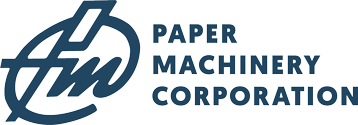—
This article originally appeared on Biztimes.com and is posted here by permission.
Luca Dellomodarme, Scott Koehler and Michael Kazmierski don’t expect much to change about Paper Machinery Corp., which was recently turned over to employees in a surprise announcement.
The three were given responsibility for operational control as Donald and John Baumgartner initiated an employee stock ownership plan.
“The risk of failure had been there for 64 years,” said Kazmierski, who was named executive vice president of sales as part of the transition. He acknowledged it is a little more daunting to not have the family to support the company, but said he believes Paper Machinery Corp. is positioned for a bright future.
In the days following the announcement, the company held meetings with employees to explain what it means to be employee-owned. The leadership team met to discuss changes. Among them was a need for more stringent budgeting.
“In the past, as a family-owned company, you spent what you had to spend to get the job done. Now, we need to predict what we will spend. That will be fun,” Kazmierski said with a smile.
But to the outside world, it will appear not much has changed, said Dellomodarme, who was named chief executive officer as part of the transition.
“Our customers keep coming back to us because of the PMC name. The PMC name is built on solid engineering, it’s built on quality, it’s built on service. I don’t think you can separate one from the other,” he said.
Dellomodarme added customers know they are getting a machine that can last 40 years or more.
“To change that formula would be silly,” he said. “There’s no sense in doing that.”
The company’s main products are machines used to form paper cups and other packaging. Customers are suppliers to McDonald’s Corp., Starbucks Corp. and KFC Corp. Kazmierski said about 70 percent of the cost of making cups comes from materials and the balance is labor. The result is that product development has focused on pushing machines to higher and higher speeds.
“The faster the machine can run, the better you can compete in the marketplace,” he said.
Paper Machinery Corp. has been able to increase the speed of its machines by more than 37 percent over the last roughly 20 years. The PMC 1001 model is capable of 240 cups per minute and the newer PMC 1003 produces 330 per minute.
In addition to speed and efficiency, innovation comes in the form of safety. The company’s machines are also used in packaging foods like ice cream. With machines going directly into food processing facilities, Paper Machinery had to adapt the technology to allow users with less knowledge to operate them. That resulted in advances for the cup producers that allowed them to reduce the labor needed to run each machine.
“It was kind of a cross-pollination of the technology,” Kazmierski said.
Other improvements come from Paper Machinery’s technicians. The same employees who build machines also install and service them. Dellomodarme said the technicians’ experiences at the customer facilities are often the genesis of future improvements.
“There’s an intrinsic value to the customer-supplier relationship that they know their mechanics can relate to our mechanics directly,” he said. “A lot of them have friendships with the folks in the field.”
Koehler, the company’s chief financial officer, said the hope is employees will continue to take more ownership now that the ESOP is in place. He said there were already some examples of people taking things more seriously, although he added several had jokingly stopped in his office to tell him to get to work.
Kazmierski, who has been with the company since 1974, said he already felt like PMC had a great work environment before the ESOP was announced.
“Things couldn’t have gotten any better,” he said. “But they did.”
